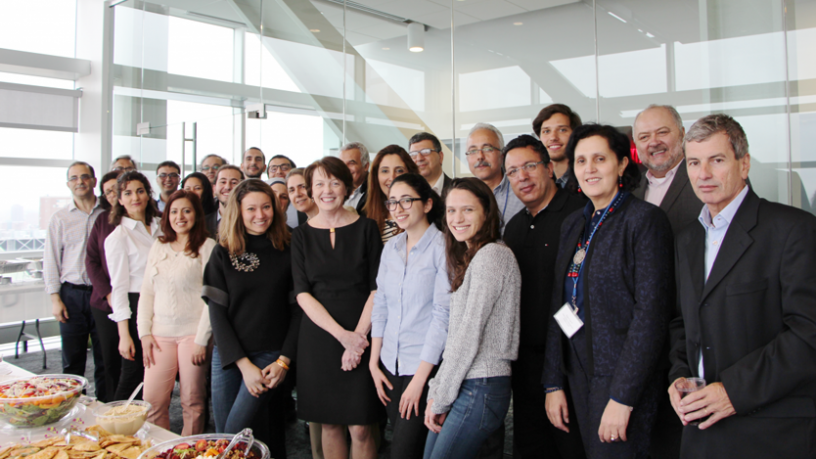Entrepreneurship and Innovation from Tunisia to New York
An envoy of Tunisian engineering and business university professors flew to Morningside Heights this spring for a whirlwind week devoted to sharing Columbia’s expertise in entrepreneurial education. The intensive eight-day program introduced participants to faculty and staff from Columbia Engineering, the Business School, and across the university, with the goal of fostering a stronger entrepreneurial ecosystem back home.
Tunisia is an emerging democracy that in late 2010, was home to the Sidi Bouzid Revolt, or Jasmine Revolution, a wave of protests that helped spark the Arab Spring. The relatively stable and prosperous country was able to transition to democratic rule and avoid much of the violence that afflicted the region, but still struggles with slow growth and high unemployment.
At the invitation of Tunisia’s Ministry of Higher Education and Scientific Research, and with support from the US Embassy in Tunis, a Columbia team visited in January 2016 to meet with faculty, students, and administrators from engineering and business schools in three different cities. Team members Paula Anzer, director of strategic initiatives for Columbia Engineering, and Ahmad Mousa, senior program officer at the Columbia Global Center in Amman, Jordan, hosted a workshop from April 27 to May 5 that brought 11 faculty and three directors from Tunisia to New York to experience a dynamic entrepreneurial culture and to see how to nurture homegrown ventures that are student-driven and faculty supported.
In immersive workshops and how-to sessions on campus and downtown at the Columbia Startup Lab, participants learned about efficient product development, customer discovery, networking, and teaching entrepreneurship across disciplines. They met with Columbia entrepreneurship experts, students, alumni, and faculty including Sam Sia, associate professor of biomedical engineering; Katherine Reuther, lecturer in biomedical engineering; and R.A. Farrokhnia, who holds joint appointments at Columbia Business School and SEAS. Ivy Schultz, a leader of entrepreneurship programs for SEAS and instructor for the National Science Foundation's I-Corps program, spoke to the group about the Lean Launchpad methodology.

Columbia Engineering and Columbia Global Centers hosted a visit for a group of professors from engineering and business schools in Tunisia.
—Photo by Trevor Arnett
The visitors also got to see the Columbia Venture Competition finals in the technology, global, and undergraduate challenges as well as attending both the Columbia Startup Festival and the Senior Design Expo.
“The experience at Columbia met all my expectations,” said participant Houda Ghozzi, who teaches social entrepreneurship at Institut des Hautes Etudes Commerciales (IHEC) de Carthage. “The program was rich and campus is a real nest of inspiring faculty and students—a vibrant ecosystem that makes you dream of developing your own.”
"Columbia has a long-standing commitment to innovation and entrepreneurship," said Mary Boyce, Dean of Columbia Engineering. "We are excited to be working in partnership with our colleagues in Tunisia as they accelerate the expansion of their innovation and entrepreneurship ecosystem."
Back in Tunisia, the participants have energetically established a network across their engineering and business schools to help create a sustainable entrepreneurial ecosystem in and around university campuses. Proposed plans include a national university-wide competition for budding entrepreneurs and academic reforms to encourage more interdisciplinary collaboration between students, faculty, and industry, with particular emphasis on catalyzing multi-disciplinary teams that include both engineers and business students.
“The visit showed the incredible impact an institution of higher education can deliver, offering knowledge creation and dissemination and the opportunity to attract such great potential,” said Ghozzi. “It was all about opening eyes and minds to a different system in which companies, students, and faculties can merge together into magnificent organizations where ‘support’ is the key word.”
